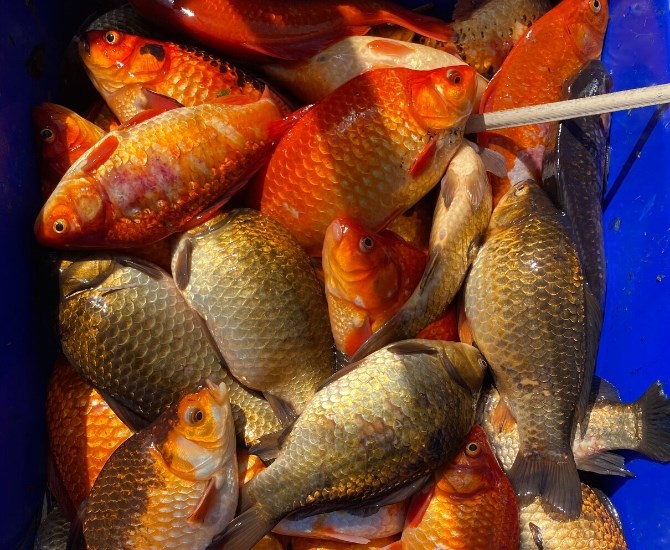
Goldfish caught in Dragon Lake, weighing anywhere between 1 and 5 pounds.
Image Credit: SUBMITTED / Chris Tisdale
September 13, 2020 - 4:39 PM
Dumping a couple of unwanted pet goldfish in a lake may not sound like a big deal but two can quickly turn into two thousand and once goldfish are introduced, it's very difficult to get rid of them completely.
This has long been an issue in Quesnel's Dragon Lake, especially in the last five years.
It's a concern for environmentalists and locals alike, as the invasive species poses a threat to native trout.
"It’s a really important fishing lake," Executive Director for the Invasive Species Council of B.C. Gail Wallin said. "The black water trout is a particular strain of trout that is relatively unique, and this is a unique lake that provides habitat area."
The Freshwater Fisheries Society of B.C. uses Dragon Lake as a brood source for black water trout. Trout eggs are taken from the lake, fertilized on site, reared in hatcheries and used to stock lakes all across the province.
Black water trout are particularly sought out by fishermen as they grow quite large.
Fishing tournaments have long brought tourists to the area, which generates revenue for the surrounding community.
However, the goldfish threaten to put a stop to this, for a number of reasons.
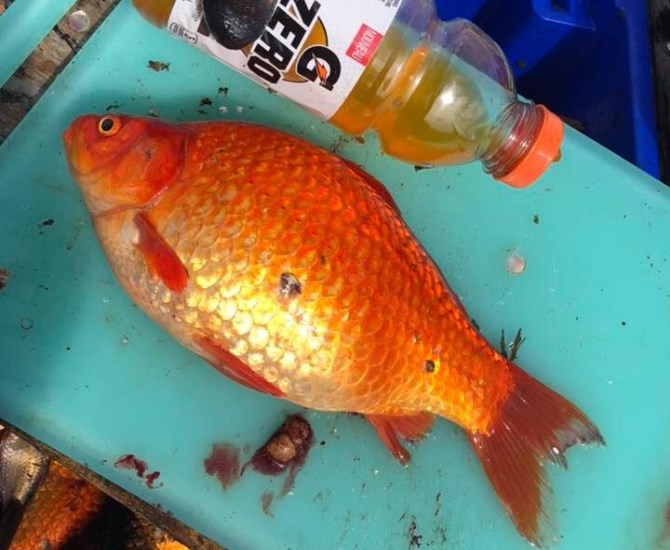
A goldfish caught in Dragon Lake, near Quesnel B.C.
Image Credit: SUBMITTED / Trelane Hargreaves
"These goldfish, which become quite big, actually compete with native trout," Wallin said. "They feed on the same food supply."
The goldfish seen in Dragon Lake are about 24 centimetres long, and weigh anywhere from one to five pounds.
That's because their environment determines their size.
"If you’ve got a little aquarium bowl, (the goldfish) stays small," Wallin said. "In a big size lake... it starts reverting back to its native characteristics. It comes from the carp family, so it grows larger."
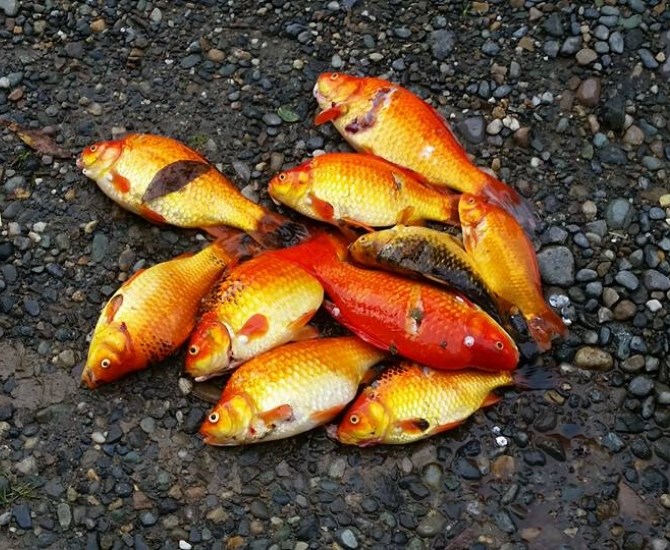
Goldfish caught in Dragon Lake, near Quesnel B.C.
Image Credit: SUBMITTED / Trelane Hargreaves
One reason why goldfish are difficult to remove from a lake is that they are very adaptable.
TRU Aquatic Ecologist Dr. Brian Heise and his undergraduate students have been studying the goldfish in Dragon Lake.
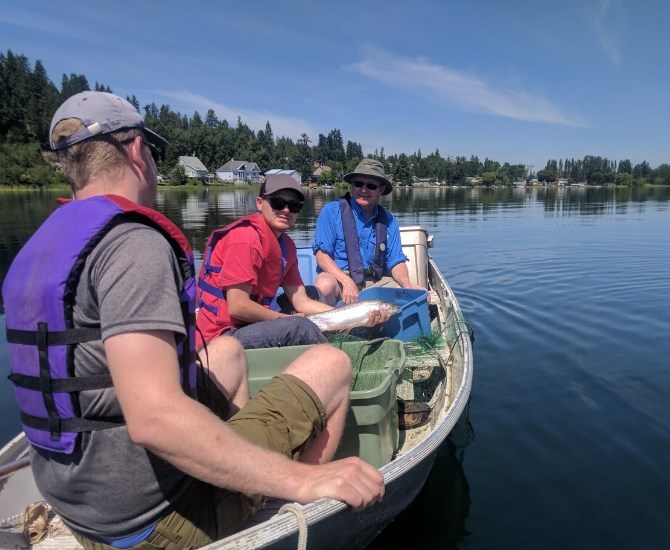
Dr Heise and his students have been conducting research on the goldfish in Dragon Lake.
Image Credit: SUBMITTED / Brian Heise
Over time, they have noticed that more and more of the goldfish are changing colour to a dull grey.
"Goldfish actually don’t naturally have that golden colour, that’s something that the pet industry has produced," Heise said.
"The brightly coloured ones will often get picked off by predators… and so you gradually over time get a change in the dominant colour of the fish."
Goldfish are also very hardy, and difficult to get rid of.
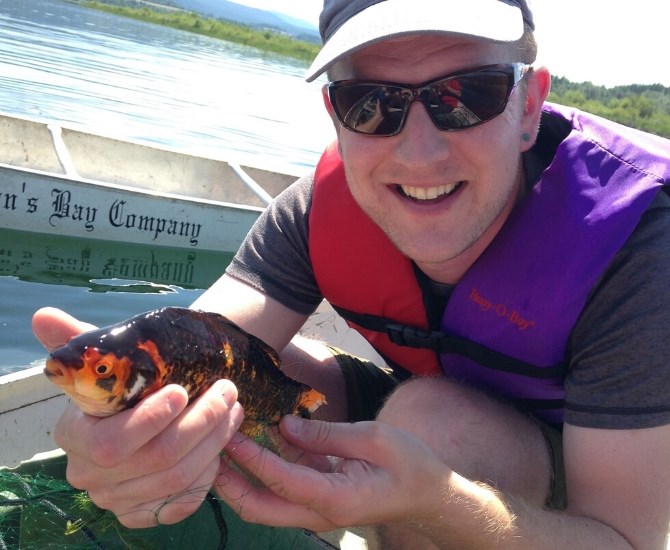
Dr Heise and his students have been conducting research on the goldfish in Dragon Lake.
Image Credit: SUBMITTED / Brian Heise
"They’re just an amazing fish actually," Heise said. "Unfortunately for us, they’re a great invasive species, they have a biology that allows them to survive under terrible conditions."
For example, during the winter if oxygen levels in a lake are low, trout would die off long before goldfish, he said.
That's because their biology allows them to survive several weeks without oxygen.
READ MORE: North Okanagan landowners show why goldfish should stay in the bowl
Another characteristic of interest to researchers is the ability for goldfish to reproduce without males.
"The females will produce eggs, they will then swim around the lake and find sperm from other minnow species," Heise said. "They then take that sperm, put it on their eggs. The sperm doesn’t fertilize the eggs, but it stimulates the eggs to start dividing, so you get clones."
One female goldfish may breed three times and produce up to 50 thousand eggs every year, Wallin said.
This explains why locals have noticed an explosion of the goldfish population in Dragon Lake.
Quesnel resident Trelane Hargreaves first noticed the goldfish four years ago. After contacting local fisheries about the issue, he decided to start spear fishing for them.
"Before long there were hundreds of local people interested," he said. "Some people absolutely denied and (didn't) believe what I was saying to the point of even accusing us of photoshopping the images."
Soon enough however, the issue was undeniable.
The Baker Creek Enhancement Society obtained a fish collection permit in 2016, and locals like Hargreaves have been chipping in with the removal efforts.
This year, following recommendation from Heise, electrofishing is being used to reduce the population in an attempt to mitigate the goldfish's negative effects on the lake.
Electrofishing uses a generator in a boat that sends out electric pulses that stun the fish, which provides an opportunity to scoop them up in large quantities for removal.
Fisheries consultant Gene Tisdale is leading the operation, funded by the Freshwater Fisheries Society of B.C. Tisdale has four years experience electrofishing in other lakes, but this is his first year at Dragon Lake.
"If you remove a bunch of these invasive fish, you leave a lot more bug life in the water to hatch," he said.
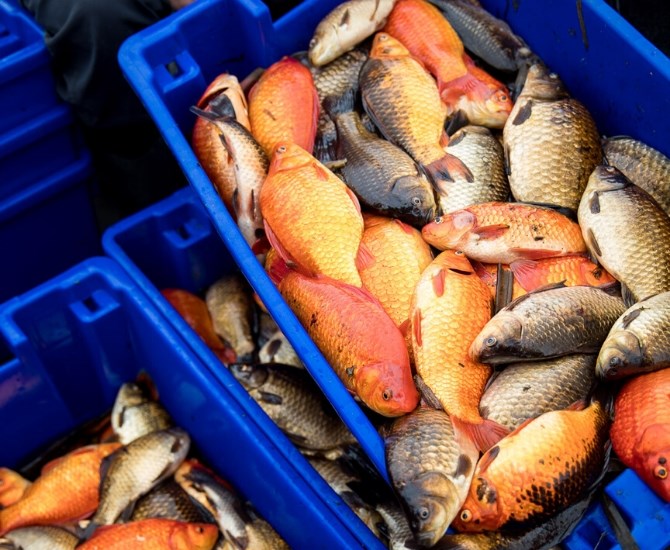
The goldfish are removed from the lake using electrofishing and put into bins.
Image Credit: SUBMITTED / Chris Tisdale
This is important for maintaining the food supply for other animals in the ecosystem, like birds, turtles, frogs, bats, and others.
Funding for the project is in place for three years, but electrofishing is more a method of population management than total eradication.
"Maybe once the population is low enough, maybe the fish and the other predators in the lake can control the goldfish," Heise said.
Based on his research, he feels that this method is the best and most cost effective way to address the issue. Because Dragon Lake is so large, and also provides a brood source for trout, killing off all the fish in the lake is not an ideal option.
Only time will tell whether or not electrofishing will solve the goldfish problem in Dragon Lake, but there's one thing all environmentalists can agree on.
"Don’t take goldfish or koi from your fish tanks or backyard ponds and stick them in the lake," Heise said.
"Just don’t do it."
To contact a reporter for this story, email Brie Welton or call (250) 819-3723 or email the editor. You can also submit photos, videos or news tips to the newsroom and be entered to win a monthly prize draw.
We welcome your comments and opinions on our stories but play nice. We won't censor or delete comments unless they contain off-topic statements or links, unnecessary vulgarity, false facts, spam or obviously fake profiles. If you have any concerns about what you see in comments, email the editor in the link above.
News from © iNFOnews, 2020